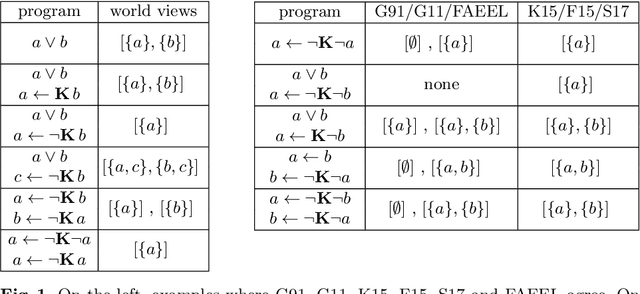Luis Fariñas
Metric Dynamic Equilibrium Logic
Jan 19, 2024Abstract:In temporal extensions of Answer Set Programming (ASP) based on linear-time, the behavior of dynamic systems is captured by sequences of states. While this representation reflects their relative order, it abstracts away the specific times associated with each state. In many applications, however, timing constraints are important like, for instance, when planning and scheduling go hand in hand. We address this by developing a metric extension of linear-time Dynamic Equilibrium Logic, in which dynamic operators are constrained by intervals over integers. The resulting Metric Dynamic Equilibrium Logic provides the foundation of an ASP-based approach for specifying qualitative and quantitative dynamic constraints. As such, it constitutes the most general among a whole spectrum of temporal extensions of Equilibrium Logic. In detail, we show that it encompasses Temporal, Dynamic, Metric, and regular Equilibrium Logic, as well as its classic counterparts once the law of the excluded middle is added.
Founded World Views with Autoepistemic Equilibrium Logic
Feb 20, 2019

Abstract:Defined by Gelfond in 1991 (G91), epistemic specifications (or programs) are an extension of logic programming under stable models semantics that introducessubjective literals. A subjective literal al-lows checking whether some regular literal is true in all (or in some of) the stable models of the program, being those models collected in a setcalledworld view. One epistemic program may yield several world views but, under the original G91 semantics, some of them resulted from self-supported derivations. During the last eight years, several alternative approaches have been proposed to get rid of these self-supported worldviews. Unfortunately, their success could only be measured by studying their behaviour on a set of common examples in the literature, since no formal property of "self-supportedness" had been defined. To fill this gap, we extend in this paper the idea of unfounded set from standard logic programming to the epistemic case. We define when a world view is founded with respect to some program and propose the foundedness property for any semantics whose world views are always founded. Using counterexamples, we explain that the previous approaches violate foundedness, and proceed to propose a new semantics based on a combination of Moore's Autoepistemic Logic and Pearce's Equilibrium Logic. The main result proves that this new semantics precisely captures the set of founded G91 world views.
 Add to Chrome
Add to Chrome Add to Firefox
Add to Firefox Add to Edge
Add to Edge